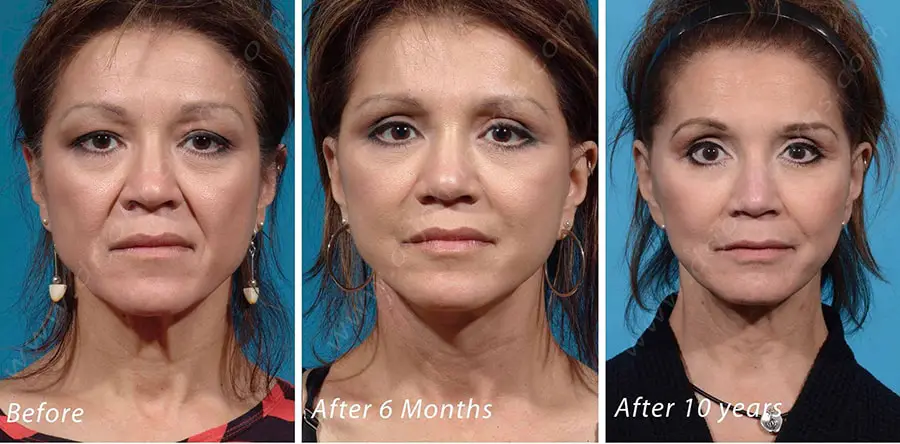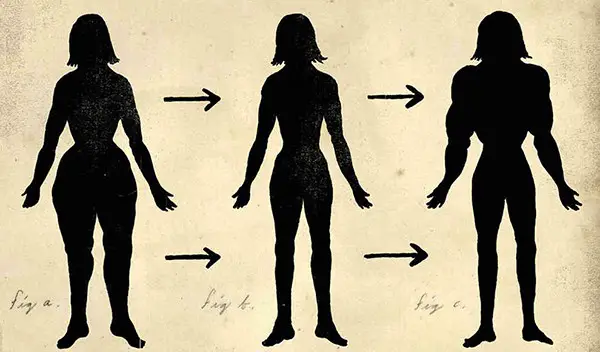
Plastic surgery procedures can be minimal or dramatic, but not all surgeries have the same longevity.
How long the results from plastic surgery will depend on several factors, like the permanence of the specific procedure, the aging process, lifestyle habits, etc. Even permanent procedures will likely “fade” as you age because your body changes. Bones remodel and soft tissue loses elasticity, sinks, and decreases in volume.
To make sure you stay looking as youthful as possible for the longest period of time, check out our guide to anti-aging.
Plastic Surgery Longevity
Firstly, you need to determine whether your procedure has temporary, semi-permanent, or permanent results. That will greatly determine whether you will have results that will last forever. However, permanent procedures may not always look the same after 10-20 years.
For instance, Botox and fillers may only be visible for 6-12 months. To truly maintain their results, you have to get it done again.
However, implants tend to be more permanent and can last for many years. You can always remove your implants if you do not want them anymore or want to change the way they look, but implants’ goal is for them to last as long as possible.
It is important to note that even the procedures that promise permanent results may not look the same over time. For instance, your cheekbone implants may look less plump as you get older, but that may due to the natural aging process (decrease in facial fat, sagging skin, etc.).

Age can also make the results “fade” over time. As we age, our bones often decrease in volume, our facial fat decreases and shifts downward, our skin sags and wrinkles, and more. These factors can change the way the results of plastic surgery would look over time.
Let’s say that you got a permanent facelift when you are 50 years old, and the facelift is supposed to make you look like you are 40 years old. When you are 80 years old, you may look like you are 70-75 years old; but you will not look like you are still 40 years old.
Another example would be rhinoplasty because the nose tends to “grow” and change over time. You might notice an obvious change in your nose about 10-20 years after rhinoplasty. The change may not be drastic, but it will likely not look the same. For instance, if you got rhinoplasty for the tip of your nose, the tip of your nose may droop as you age. It won’t look like it did post-surgery.
Some “permanent” procedures may be naturally undone. For example, liposuction will permanently get rid of the fat deposits in the treated areas. However, you will likely still gain weight in the treated areas, even if you do not normally gain fat there easily. If you gain ENOUGH extra weight, you may wind up gaining the fat back in the treated areas, so the originally permanent results would be gone.
Another example would be if you were to get a facelift. Facelifts cannot fight the aging process forever, but they can certainly decrease it. Most facelifts can last for about ten years, but you could shorten that time with bad habits. Some bad habits would include regularly creasing your skin (furrowing your brows), excessive alcohol consumption, smoking, sun exposure, etc. However, a person who tries his best to maintain their facelift results may not need a touch-up for 10-15 years.
Therefore, most plastic surgery results can last a long time, but they may not last forever. It truly depends on many other factors, and since everyone is different, there is no way to guarantee how long your results will last.

Does Plastic Surgery Require Maintenance?
Some procedures will require maintenance, especially if you want to keep the same results. You may also need to do follow-up visits if you need a series of procedures to achieve your desired results.
The “repeat time” for most surgeries can greatly vary. Some surgeries that may not need repeating include nose reshaping, rhinoplasty, tummy tuck, and otoplasty (ear pinning).
Most procedures done on the face or neck may need to get a “tweaking” 5-20 years after the procedure. However, it greatly depends on how the patient “maintained” their results, their natural makeup (genes and aging process), and how old they were when they first got the procedure.
However, it is important to note that you may not have to get more procedures after the initial one. For instance, let us say that you got a nose job to make the tip of your nose smaller. After some time, the tip of your nose would droop, but it would be up to you if you want to get another procedure to “tweak” it.
Another example would be eyelid surgery. Most people will enjoy their results for 20 years or more before they consider an enhancement. A person who gets a facelift at 50 years old may opt for a “mini-lift” when they are 60-65 years old because their skin lost elasticity.
Some people would be fine with the way their results change, so there may not be an urgent need to get more work done as “maintenance.” After all, you still want to age gracefully, no matter how much plastic surgery you get. If you notice a minor change in your results, especially with age, it may not be a big deal and may not require another procedure unless you ask for it.
For procedures on the body, it will greatly. As mentioned earlier, liposuction results may fade if you do not maintain your results, so you would either have to drop all the weight naturally or get liposuction again.
For most forms of breast augmentation; given that everything went well in the surgery, the patient may be satisfied with their results for 20+ years unless they want a “retouch.” However, other factors may affect the results and require urgent maintenance, such as nursing, pregnancy, significant weight change, and skin elasticity. Additionally, a woman who got larger breasts may need a breast lift after some time since gravity can bring the breasts down over time.

Lifestyle and Plastic Surgery Longevity
Many plastic surgeons will agree that lifestyle has a large impact on your plastic surgery. Lifestyle plays a huge role in the risk of complications, along with long-term satisfaction.
One survey showed that about 45% of surgeons limit the kinds of procedures they perform on smokers (Rohrich et al., 2002). This is because smokers tend to have impaired healing progress. After all, carbon dioxide and nicotine decrease oxygen and blood supply to the tissues. Additionally, smoking can impair a person’s pulmonary system and increase the risk of complications. Most surgeons would tell their patients to quit smoking 1-3 months before surgery and during their healing process. Ultimately, smoking can delay the healing process and overall risk of complications, which could affect the final result of your procedure.
Another example would be weight. Most surgeons need their patients to be within a reasonable weight range for the procedures (depending on what surgery needs to be done). It would help if you asked your surgeon what your ideal weight for the procedure is. Many procedures will achieve only “ok” results instead of “excellent” if you’re not at a good weight.

Gaining weight may affect the results of your plastic surgery. For instance, gaining a considerable amount of weight would ruin your liposuction results, and you may gain more weight in the untreated areas. On the other hand, if you got cheek implants to achieve cheek hollows but gained weight on your face, it would be less noticeable.
Other examples of what lifestyle habits could affect your healing and results from plastic surgery include:
- Sun exposure
- Alcohol consumption
- Diet
- Sleeping habits
- Stress
- Lack of exercise or excessive exercise
How Can I Make My Results Last?
There is no guaranteed way to make your results last forever. However, there are methods that you can try to prolong your results and to delay the need for a touch-up.
Healthy Diet and Exercise
Exercising and maintaining a healthy diet is important for everyone, but it is especially crucial for those who got a body contouring procedure. Your doctor will likely suggest that you exercise and go on a healthy diet before the surgery. Maintaining that healthy lifestyle post-surgery will help you reap the most results.
Body contouring surgeries last for as long as you let them. Getting liposuction done to remove excess belly fat while maintaining your diet and exercise routine will help you keep your results for many years. However, letting yourself go and not taking care of your body will ruin those results quickly. Most doctors will suggest that you eat a relatively healthy diet, especially before you get surgery. It may be best to avoid crash diets that “guarantee weight loss in three days” and such.
Those diets tend to be detrimental to your health and may do more harm than good. Additionally, those diets tend to make you lose more water weight than actual fat, so you would likely gain that weight back or even more once you go back to a normal diet.
Keep in mind that gaining a few pounds or having slight weight fluctuations is normal, and it may not affect your results. However, it would be best to stay mindful of your health and keep in shape if you want your results to last.
Skincare
A skincare routine is essential, whether it be to prevent scarring or to look as youthful as possible. It is generally good practice to have a decent skincare routine for your face and body, and follow the doctor’s orders to prevent potential scarring would also help you get ideal results.
Additionally, having a good skincare routine can make your results more worthwhile. For instance, you can make your skin hydrated and elastic, which will enhance and prolong the results of a facelift.
Check out our skincare guide for more info.

Quitting or Reducing Certain Habits
As mentioned earlier, smoking can take a toll on your health. It can also speed up the aging process, which can shorten how long the procedure results last. For example, smoking tends to make skin elastic and sag faster, so you might notice your facelift’s results fade after five years. Excessive alcohol consumption will also be bad for your health and affect your body, both inside and out. Consider drinking in moderation or avoiding alcohol altogether if possible.
De-Stress
We cannot avoid stress altogether, but it would be ideal to find ways to manage it and decrease your stress levels. Stress can negatively impact your mental, physical, and emotional health. It can speed up the aging process (i.e., wrinkles), delay the healing process, and make you feel unwell.
Yoga, meditation, and simple breathing exercises can help you unwind. Other ways you can de-stress are listening to music, watching a show, hobbies, etc. An underrated cause of stress is caffeine, since stressing you out is literally how it works. Cut back or eliminate coffee.
Touch-Up Procedures
In most cases, you will not have to redo a whole surgery to keep your results if you can maintain your results for as long as possible. Most people may only need a minor touch-up to try enhancing themselves.
However, it would be good to remember that plastic surgery will not stop the aging process altogether. It can decrease the appearance of wrinkles, sallow cheekbones, etc., but you may need to manage your expectations.

